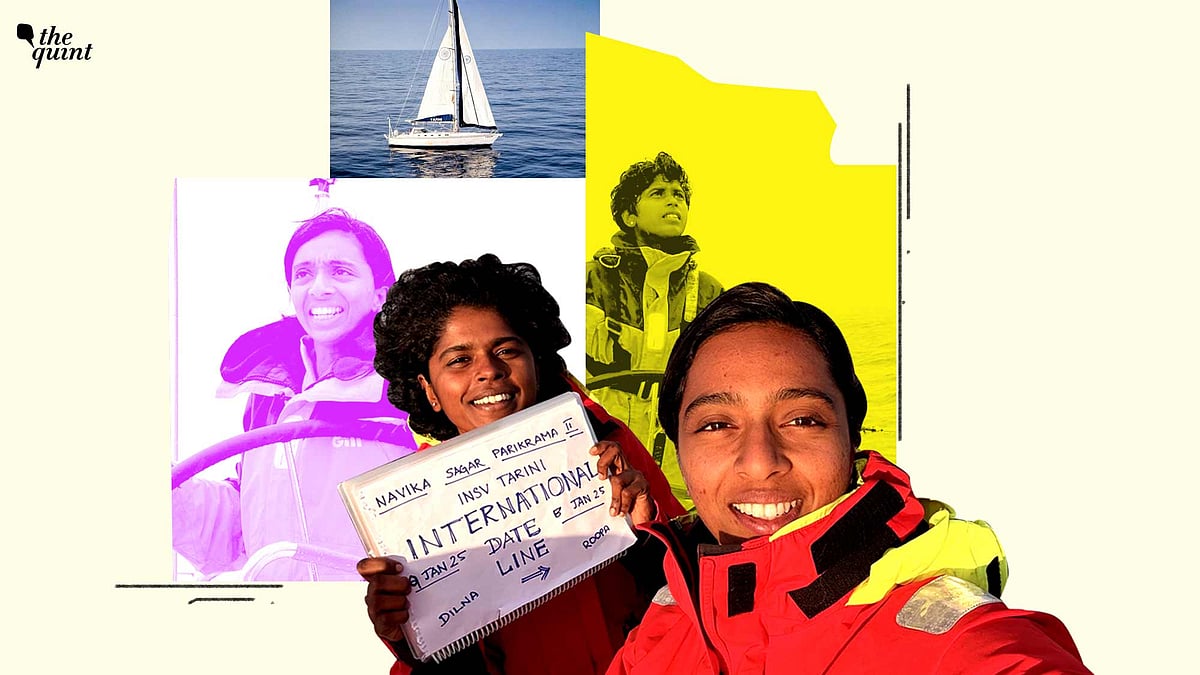
An Ode to 'Dilroo': Indian Women Navy Officers Sail the Nation to Pride
The sailor duo carried out the voyage in textbook fashion, returning to Goa with the boat looking as good as new.

advertisement
It was a proud moment for all of India on 29 May, when INSV Tarini, the Indian Navy’s sailing vessel, (wo)manned by a two-member crew, returned to Goa after circumnavigating the earth—relying only on wind power, the oceanic currents, and the grit of two intrepid sailors.
The two officers who brought Tarini home have made it to a very select group of just 10 Indians who have successfully circumnavigated the earth by sailing around the three great capes—the gold standard for sailors since the advent of sail. This is an extraordinary achievement, combining the highest levels of ocean sailing, endurance, and steely resolve.
The two officers of the navy, Lieutenant Commander Dilna K and Lieutenant Commander Roopa A—affectionately nicknamed 'DilRoo' on social media—set sail from Goa on 2 October 2024 and completed a voyage of 25,600 nautical miles over 239 days.
Lieutenant Commander Dilna K and Lieutenant Commander Roopa A on INSV Tarini.
(Photo: Special Arrangement)
'Speaks Volumes About Nari Shakti'
I spoke to the legendary Cdr Abhilash Tomy, who in 2013 became the first Indian to complete a solo, non-stop circumnavigation of the world under sail onboard INSV Mhadei. For the record, he did this again in 2023 and is among a handful of sailors worldwide who have done a non-stop circumnavigation twice.
When I asked Tomy to place the 'DilRoo' voyage in context, he noted,
He added that 'DilRoo' carried out the voyage in textbook fashion circumnavigation, and when they returned to Goa, the boat was scratchless, looking as good as new.
The Indian Navy’s ocean sailing tradition received a valuable impetus from the late Vice Admiral Manohar Awati. Captain Dilip Donde became the first Indian to circumnavigate the earth in 2010, followed by Abhilash Tomy.
#DilRoo has become a trend on social media with many applauding the sailors' feat.
(Photo: Special Arrangement)
If this 2018 all-women crew broke the glass ceiling for gender parity in ocean sailing – an activity hitherto associated with a male template – the 2024 voyage has only raised the bar. Hopefully the 'DilRoo' duo's voyage will motivate and ignite similar passions in GenNext – particularly the women across India.
The contribution made by the officers will go a long way in debunking traditional gender roles and stereotypes. All the port authorities they touched in their eight-month voyage, as well as the Western Australian Parliament, accorded them a special honour in November 2024 by receiving the crew as special invitees.
Lieutenant Commander Dilna K and Lieutenant Commander Roopa A taking a selfie at Point Nemo.
(Photo: Special Arrangement)
Inspiring the Younger Generation
Speaking to the media in Goa, the two officers recounted some of the most harrowing moments during the voyage, including one in the vast Pacific Ocean in the middle of the night, when they lost GPS, auto-pilot, wind instruments et al, and were at the mercy of the elements.
Receiving the 'DilRoo' duo in Goa on 29 May, Defence Minister Rajnath Singh commended the two officers for facing the most demanding physical and mental challenges.
Defence Minister Rajnath Singh felicitates Lt Cdrs Dilna and Roopa in Goa
(Photo: Special Arrangement)
India has a rich maritime history and heritage that is waiting to be discovered and imbued with renewed vigour—and Tarini is part of that effort. Interestingly, the first circumnavigation by Indian sailors was completed in 1985 by a team of officers from the Indian Army’s Corps of Engineers led by Major KS Rao in the sailing boat Trishna, but it did not round all the great capes.
The Indian Navy took up the challenge in 1988 when the 'Samudra' voyage was launched from Visakhapatnam. It nevertheless took another 15 years for Dilip Donde to become the first Indian to join the select band of sailors who've successfully completed the solo circumnavigation around the three great capes.
INSV Tarini at sea.
(Photo: Special Arrangement)
India’s marine tourism and related adventure activities are yet to be tapped in a sustainable and effective manner that would also involve the younger generation. It is instructive to note that Tarini was built in Goa by a local shipyard—and this is the kind of investment that needs to be encouraged.
One hopes that the success of the 'DilRoo' duo will be the catalyst and, in a near future, there will be a triumphant solo circumnavigation in the Donde-Abhilash mode by daring Indian women sailors.
(C Uday Bhaskar is a leading expert on strategic affairs. He is currently Director, Society for Policy Studies. This is an opinion piece. All views expressed are the author’s own. The Quint neither endorses nor is responsible for them.)
- Access to all paywalled content on site
- Ad-free experience across The Quint
- Early previews of our Special Projects
Published: undefined